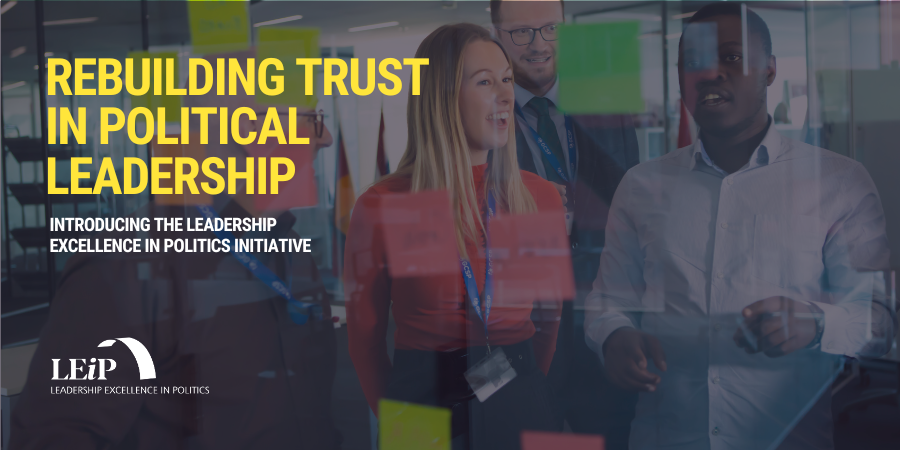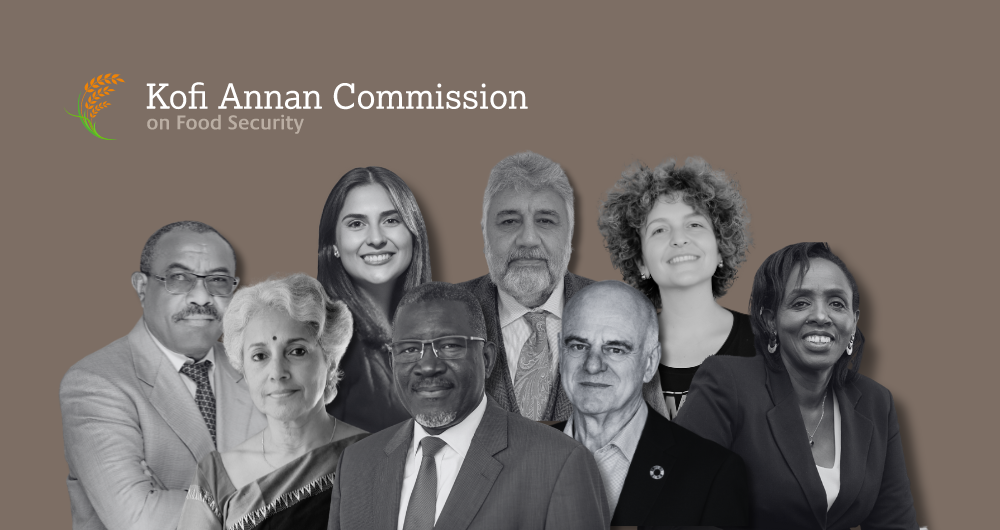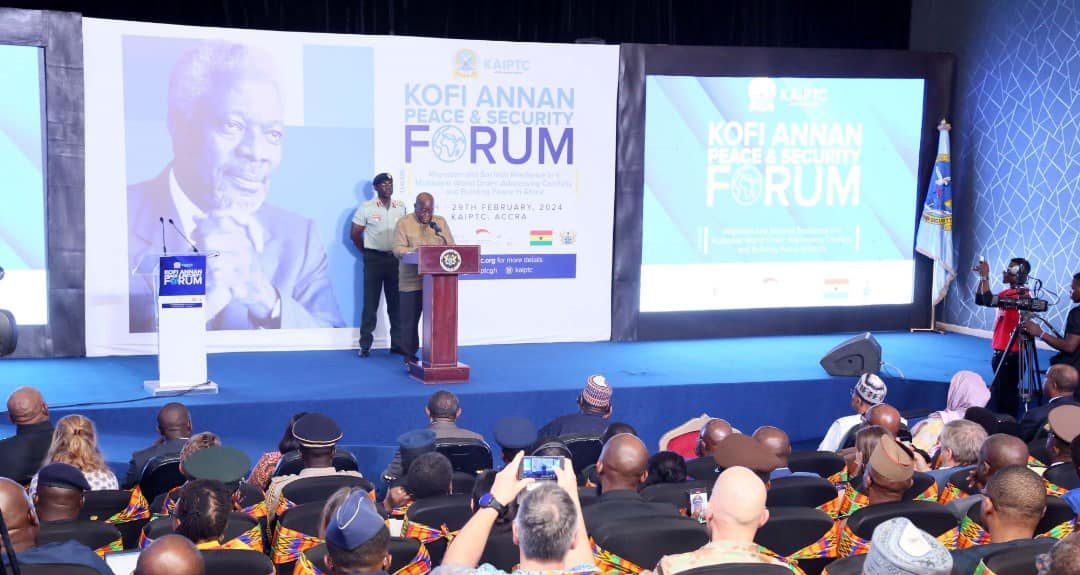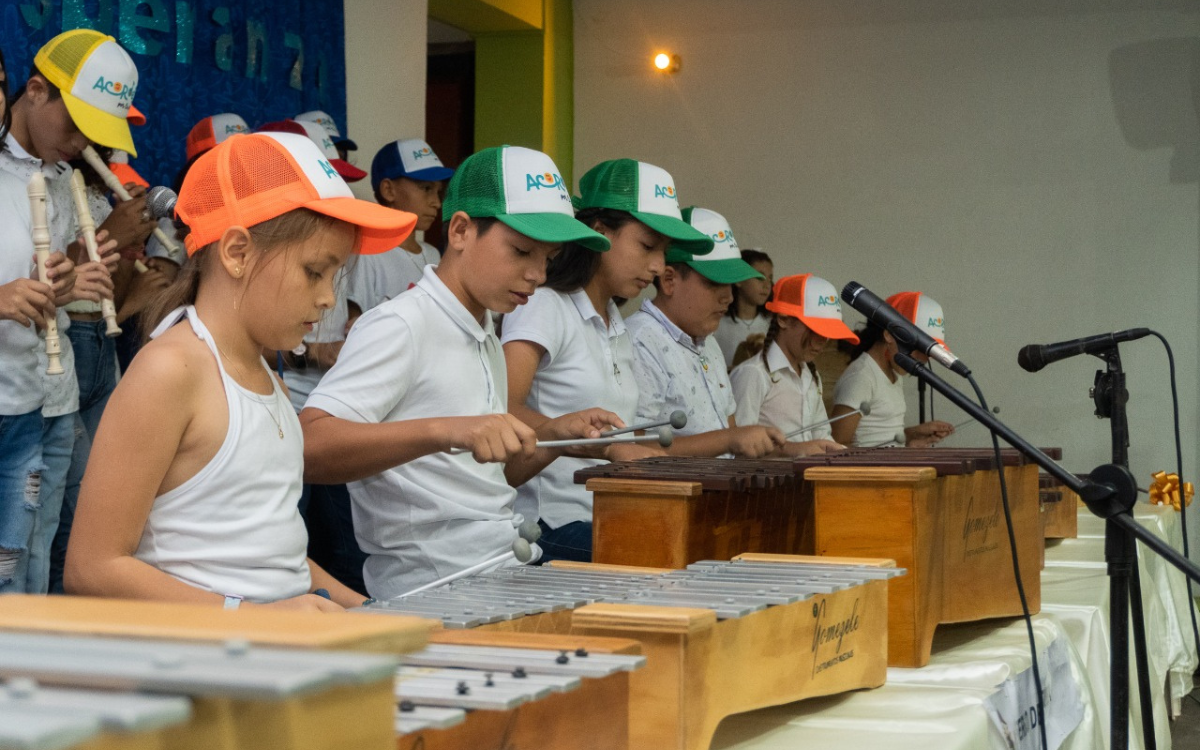The Inaugural Kofi Annan Geneva Peace Address with Nobel Laureate Ellen Johnson Sirleaf
On November 4, 2021, the inaugural Kofi Annan Peace Address took place in Geneva, Switzerland. The Address, delivered annually as part of Geneva Peace Week, is organized by the Kofi Annan Foundation, the Graduate Institute and the Geneva Peacebuilding Platform.
The Kofi Annan Geneva Peace Address was officially launched on October 12 2021 – the twentieth anniversary of the announcement that the United Nations and its Secretary-General Kofi Annan had won the Nobel Peace Prize.
Ellen Johnson Sirleaf, interviewed by Heba Aly. Photo credit: Kyle Patrick Lynch
For this inaugural address, we had the honour of welcoming Nobel Laureate Ellen Johson Sirleaf to deliver the inaugural lecture. Africa’s first democratically elected female president, Ms Johnson Sirleaf was the President of Liberia from 2006 to 2018 and is a member of The Elders. Johnson Sirleaf was awarded the Nobel Peace Prize in 2011 for her “non-violent struggle for the safety of women and for women’s rights to full participation in peace-building work.”
The lecture was followed by a Q&A session moderated by Heba Aly, CEO of The New Humanitarian.
Watch the inaugural Kofi Annan Geneva Peace Address
Following the Footsteps of a Changemaker: Lecture delivered by Ellen Johnson Sirleaf
These remarks were delivered live during the inaugural Kofi Annan Geneva Peace Address on November 4 2021 in Geneva, Switzerland.
Corinne Momal-Vanian – Executive Director, KAF
Thank you to the Geneva authorities and co-organizers of the event
Excellencies, distinguished guests, ladies and gentlemen
It is an honor, and a capstone of my own life’s work, to be delivering the inaugural Kofi Annan Geneva Peace Address to commemorate the life and passion of Kofi Annan — one of the world’s greatest statesmen and diplomats — and to uphold the enduring values of peace. It truly is a tremendous honor.
From a generation of African political pioneers, Kofi Annan and I were dreamers. Born six months apart, in 1938, we fervently believe that building the institutions of democracy and ensuring that these institutions deliver for the people are fundamental to securing and maintaining the peace.
Kofi lived his life anchored in this fiercely-held faith. Throughout his two terms as Secretary General to the United Nations, he demonstrated these values every decision and global advocacy for change and for peace. He also embedded these values into the Kofi Annan Foundation, where he focused on promoting elections and democracy, and advocating for the inclusion of the youth, women, and girls into mainstream participation in both business and politics.
As the world makes its painfully slow recovery from the Coronavirus Pandemic and confronts a climate crisis that falls disproportionately on the global South, standing in the shadows of this great man, I feel a renewed sense of urgency to carry on the work of my life-long compatriot, even after just celebrating my 83rd birthday, on last Friday.
Distinguished audience, in this spirit of Kofi, which I am confident hovers above us here today, let me tell you how I ushered in my birthday.
Last week, the Ellen Johnson Sirleaf Presidential Center for Women and Development, inaugurated on International Women’s Day, in March of 2020, reconvened for the first time since the COVID-19 outbreak.
The gathering in Monrovia brought together the 15 cohorts from 2020 of the Amujae Initiative, the flagship undertaking of the Center, with the new class of 2021. These three dozen women, from 16 African countries, including activists, senior government leaders, CEOs and heads of civil society organizations, were singled out by the foundation’s leadership as change-makers and force-multipliers in their countries and communities.
During three days of trainings, we reflected upon the pioneering women of history who carried the torch for freedom and human rights. We applauded the current women who have established, without doubt, the claim of global leadership based on equal or higher levels of capabilities and courage and with the added value of empathy and concern for human dignity. We huddled together, to support each other, learn from one another, and recommit to uplifting women and, in doing so, the human condition.
We debated whether change could come from the inside, or if the work was on the streets. We marked our progress of these past two years, and, for many, marked some painful setbacks. We argued, sacrificed much-needed sleep, laughed, cried, danced, and ate cake. We were energized by each other, and as a sorority, we became greater than the sum of our parts.
As we know, African women, by definition, are political outsiders; they threaten the governing status quo—a status quo that for too long has held onto power at all costs, while their citizens live in want and deprivation, with their untapped potential never fully realized.
Amujae seeks to enhance the capacity of women in public leadership, helping to increase their effectiveness in their current roles, and in their life’s pursuits. In addition, the Amujae cohorts, with the Center as their platform, continue to work to challenge systemic barriers to girls’ and women’s advancement.
The Center and the Amujae leaders aim to change the course of African history, one capable, and unapologetically ambitious female leader at a time.
It’s a worthy goal. But I know what Kofi would say to me if he were sitting in the audience today. He would politely clap, but remain in his seat, and say ‘well done, Madam President.’ He would then ask me: ‘Is that all? Is that enough?’
And Kofi would have every right to say that. He always believed leaders have a duty to do more – to work harder, and inspire more success.
Kofi Annan, ever the institutional man, found a way to improve the system from within. He was the quiet change-maker, not the rabble rouser. He altered mindsets and transformed our global post-war institution into one that placed the people it was created to serve at its center.
As Secretary General, Kofi set in motion the Millennium Development Goals, which today are the Sustainable Development Goals and have become how the world measures the human condition.
He secured the global commitment for The Doctrine “The Responsibility to Protect which speaks loudly to the repression of freedom, and the misuse of political powers to inflict wrongs, sufferings and brutal violence on the people leaders have a duty to serve.
He also built the structural foundation for the International Criminal Court, the Rome Treaty, the Global Compact and the Peacekeeping Doctrine. He established UNAIDS in response to the HIV/AIDS Pandemic, and subsequently the Global Fund. Today, the Global Fund is mobilizing resources for COVID-19, like it did in 2014 during the Ebola outbreak.
He Chaired and nurtured “The Elders”, a group of eminent, independent global leaders who work to promote peace and human rights, and to challenge leaders and institutions when these values are violated.
Similarly, he affiliated with the African Progress Panel that brings together African leaders to advocate for equitable and sustainable development in Africa, in memory of the works of Africa’s pacesetter for peace and reconciliation. Kofi Annan was a leader of the world, and a consequential one impressing lasting impacts on the peace, dignity and security of the global human family.
When African and world leaders meet in Accra on December 8 and 9 at the Kofi Annan International Peacekeeping Training Center to discuss Democracy and Governance in the continent of complex crisis in West Africa, we will remember the work of Kofi Annan’s spirit and endeavor for peace. Did we do enough?
I met Kofi at the United Nations in 1992, when I was appointed head of the UN Development Program for Africa. I had just been forced into exile from war-torn Liberia, my home. After five years of service, in 1997, I requested a private audience with him. It was only the second with him.
I was nervous, as I held him in such high regard and was worried that I would disappoint him. And then I summoned the courage to announce to him. “I must resign from the United Nations and go home to Liberia, to challenge the rule of war lords. I will run for President against Charles Taylor.”
Kofi fixed is eyes on mine. He showed no disappointment. On the contrary, he stood up, shook my hand, and said, “if that is what you must do, and with your heart, you believe that you can make a difference, then go. The Liberian people await you”.
Make a difference, the world awaits you – these words defined his life of service to the United Nations and to the world. Kofi Annan made a difference for the world.
His words became my mantra and a source of inspiration to which I would frequently return in the quietude of the ebbs and flows of a difficult journey for political leadership, which as a woman, I dared to seek. I would often fall back on those words as I struggled to overcome the hurdles of being the first woman to be democratically-elected President on the African Continent and undertook the task of leading in a country whose culture and values were severely compromised by years of violence, dependency and indiscipline.
So, I went home. I contested the election, and I lost. But 8 years later, I tried again. And while my commitment to the peace and recovery of Liberia was unwavering, so was Kofi’s. There are fewer figures who were more instrumental to peace in Liberia than he.
As Secretary General, Kofi authorized the UN Peacekeeping Force, UNMIL, in 2003, and kept them there reaching a peak of up to 18,000 representing the highest deployments of UN Peacekeepers at the time. This helped secure a legitimate electoral process in 2005 and is deservingly recognized as one of the most successful UN peacekeeping operations. Further, he helped to mobilize over $500 million from the donor community to support the nascent Transitional Government, which was so pivotal in a country that was so devastated through decades of civil war.
His leadership and support helped maintain peace in Liberia, and allowed my country to restore our dignity, reform our government, and strengthen our democracy.
In large parts to this support, I won a legitimate election in 2005 and became the first woman democratically elected to lead an African nation.
This was November 8, 2005.
On Monday, it will be sixteen years since the historic victory. And since that time no other woman on the continent has claimed such a high office through a democratic election.
We must do more, as individuals and as a collective community. The Sustainable Development Goals he visualized will not be fully realized unless women have hurdles and restrictions removed from their paths to full participation in political processes and national decision-making.
Distinguished audience, it is not lost on me that Kofi Annan and I share not just the year of our births but the honor of being considered outsiders and therefore firsts in such respects. Of course, I stand in his shadow with the hope the trails we have blazed will inspire many more to follow. Being outsiders and firsts, did not stop us from pushing ourselves. In fact, it motivated us to strive to do more.
Today, in Africa, our native Continent, and in other places across the globe, democracy and the empowerment of people cannot be permitted to fail. Multilateralism cannot be overcome by the creeping wave of authoritarianism.
In this regard, we must continue to pave the way for the breakthrough of political outsiders especially women, youth and other disenfranchised and disadvantaged populations too long kept on the fringes of the society and global institutions. They must be included, supported and encouraged to seek power, and to make a difference, not as an end in and of itself, but as a means to achieving the inclusive ends that truly empower all peoples. That is the Kofi Annan way.
My message to all of you today, in the spirit of my dear friend, mentor, and older brother Kofi, is we cannot go back. It is not enough to build back better. We must build forward. We must move on.
The Center and my fellow Amujae leaders, some of whom have accompanied me here today, promised to tackle the institutional barriers to women partaking in leadership and politics, one obstacle at a time. This is the Kofi Annan way.
We will take our appeal to the Africa Union, the European Union, the United Nations, the G-20, the G-7, to put the issue of women equality and participation on the same stage with global warming and climate. For only by ensuring that full participation of everyone in all aspects of the democratic process, can we ensure lasting and durable peace. It is clear that only through inclusion can we truly combat division.
And then from there, we follow the model that Kofi laid out, a single person making a difference – leaving a legacy for generations to come.
Ladies and gentlemen, I challenge you as Kofi challenged me: Look into your hearts, believe you can make a difference, then go and make that difference. As it did for me, as it did for Kofi, the world awaits each and every one of you.
Thank you.



